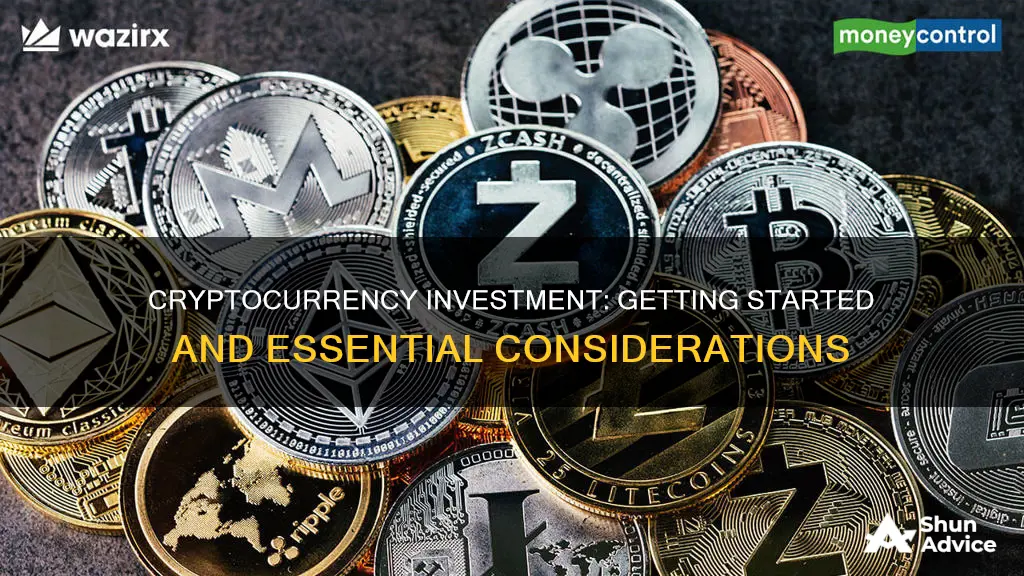
Investing in cryptocurrency is a hot topic, but it's important to understand the risks and potential rewards. Cryptocurrency is a digital asset that can be bought and traded on crypto exchanges. It's considered a high-risk investment due to its volatile nature and lack of government backing. However, the potential for high returns and its status as an emerging market make it an attractive option for some investors. Before investing, it's crucial to do your research, understand the technology and risks involved, and only invest what you can afford to lose.
| Characteristics | Values |
|---|---|
| Knowledge | You need to understand the risks and volatility of the cryptocurrency market. |
| Capital | You need money to invest, ideally money you can afford to lose. |
| Platform | You need to choose a broker or exchange that supports your desired cryptocurrencies. |
| Account | You need to create and verify an account on your chosen platform. |
| Payment method | You need to link a bank account or credit card to your account to facilitate deposits and withdrawals. |
What You'll Learn

What is cryptocurrency?
Cryptocurrency is a digital or virtual currency that uses cryptography to secure transactions. It exists solely in electronic form and operates independently of any central authority, such as a government or bank. Instead, cryptocurrencies operate on decentralized networks, most commonly blockchain technology.
Cryptocurrency is a peer-to-peer system, meaning it can enable anyone, anywhere, to send and receive payments without the need for intermediaries like banks. When you transfer cryptocurrency funds, the transactions are recorded in a public ledger, and the cryptocurrency is stored in digital wallets.
The first cryptocurrency was Bitcoin, which was founded in 2009 and remains the most well-known and valuable cryptocurrency. Other popular cryptocurrencies include Ethereum, Binance Coin, and Dogecoin.
Cryptocurrencies are created through a process called mining, which involves using computer power to solve complicated mathematical problems to generate coins. They can also be bought from brokers and stored in digital wallets.
One of the defining features of cryptocurrencies is that they are generally not issued by any central authority, making them theoretically immune to government interference or manipulation. This decentralization allows cryptocurrencies to exist outside the control of governments and central authorities, and some experts believe blockchain and cryptocurrency will disrupt many industries, including finance and law.
The advantages of cryptocurrencies include cheaper and faster money transfers, and the removal of single points of failure, such as large financial institutions, that can cause global crises. Cryptocurrencies also provide greater privacy than traditional financial systems, as transactions are pseudonymous.
However, there are also disadvantages and risks associated with cryptocurrencies. They are highly volatile, meaning their prices can fluctuate drastically, and they have attracted a reputation as unstable investments due to high investor losses from scams, hacks, and bugs. Cryptocurrencies also face regulatory risks, as their legal status is unclear in many areas, and they have been associated with criminal activities due to the privacy they offer. Additionally, mining cryptocurrencies can require a significant amount of energy, leading to high energy consumption and environmental concerns.
Despite the risks, cryptocurrencies have seen significant price increases, and some people have created substantial fortunes by investing in them.
Bitcoin: A Real Money-Making Investment?
You may want to see also

How does cryptocurrency work?
Cryptocurrency is a digital payment system that doesn't rely on banks to verify transactions. It is a peer-to-peer system that enables anyone to send and receive payments anywhere in the world. Cryptocurrency payments exist as digital entries in an online database that records transactions. When you transfer cryptocurrency funds, the transactions are recorded in a public ledger, known as a blockchain.
Cryptocurrencies are created through a process called mining, which involves using computer power to solve complicated mathematical problems that generate coins. Mining also validates cryptocurrency transactions, adding them to the blockchain.
The first cryptocurrency introduced was Bitcoin, which was founded in 2009 and remains the most commonly traded. It was created by an individual or group operating under the pseudonym Satoshi Nakamoto. Bitcoin transactions are verified by other users of the network, and the process of compiling, verifying and confirming transactions is often referred to as 'mining'. Miners are rewarded with new Bitcoins for their efforts.
Other more common cryptocurrencies, called altcoins, include Ethereum, Cardano, Solana, Dogecoin, and XRP.
To start investing in cryptocurrencies, you'll need to choose a broker or a crypto exchange. An exchange is an online platform where you can trade cryptocurrencies without a third party. A broker can help you find buyers for your cryptocurrency. Once you've selected a platform, you'll need to create and fund your account. You can then select a storage method, such as a hot or cold wallet, and make your first cryptocurrency purchase.
Schwab Bitcoin Investment: Is It Possible?
You may want to see also

How to invest in cryptocurrency?
Investing in cryptocurrency is a high-risk endeavour, so it's important to be aware of the potential pitfalls before proceeding. If you're prepared to lose all your money, read on to find out how to invest in cryptocurrency.
Firstly, you'll need to choose a broker or exchange that supports your desired cryptocurrencies. Popular options include Robinhood, SoFi, Binance, and Coinbase. Once you've made your selection, you'll need to create and verify an account. This typically involves choosing an account type, verifying your identity, agreeing to the terms of service, and linking a bank account.
After setting up your account, you'll need to fund it by transferring money from your bank. Then, you can start trading! The process of buying and selling cryptocurrency is similar to that of stocks. However, it's important to remember that the crypto market is highly volatile, and prices can fluctuate rapidly.
When investing in cryptocurrency, it's crucial to diversify your portfolio and not put all your eggs in one basket. Consider investing in multiple coins, such as Bitcoin, Ethereum, and altcoins like Solana and Dogecoin. Additionally, keep yourself informed about current trends, such as artificial intelligence, decentralized applications, and digital asset trading, which can impact the market.
It's also important to remember that cryptocurrency is a relatively new asset class, and regulations are still evolving. Be cautious of scams and fraud, and always do your due diligence before investing.
Finally, don't forget to consider the tax implications of your crypto investments. In many places, cryptocurrency is treated as a capital asset, and you may need to pay capital gains taxes on any profits you make.
Cryptocurrency's ESG Investment Future: Sustainable or Risky?
You may want to see also

How much does it cost to buy cryptocurrency?
The cost of buying cryptocurrency varies depending on the type of crypto you are buying and the platform you are using. Many small altcoins trade for a fraction of a cent, while a single bitcoin will cost you tens of thousands of dollars. However, many brokerages and exchanges now allow fractional trading, giving investors the option to buy a portion of a cryptocurrency.
There are also often costs and fees associated with having a crypto wallet and/or an account on a brokerage or crypto exchange. For example, Coinbase charges maker and taker fees of 0.40% and 0.60% respectively for trading volumes of less than $10,000, while trade volumes of more than $10,000 decrease in tiers based on how much you trade.
Some exchanges might still charge a per-transaction fee, but most have transitioned to a combination fee schedule. Small and infrequent trades are generally not cost-efficient at cryptocurrency exchanges unless you're only looking to buy a cryptocurrency. In that case, most exchanges charge a spot trading fee to buy and take possession of a digital coin.
It's important to note that the cost of buying cryptocurrency doesn't include the potential costs of setting up and maintaining a crypto wallet. There are two types of digital wallets: hot wallets and cold wallets. Hot wallets are typically free and provided by the exchange where you purchased the cryptocurrency. Cold wallets, on the other hand, can cost less than $100 and are considered much more secure than hot wallets.
The Beginner's Guide to Investing in Dogecoin
You may want to see also

How to report crypto on taxes?
To report your crypto on taxes, you must treat it as property and follow the same general tax principles as you would for transactions involving property. The IRS treats cryptocurrency as "property", so if you sell, trade or exchange cryptocurrency, you will likely have to pay crypto taxes.
You will need to use Form 1040 Schedule D as your crypto tax form to reconcile your capital gains and losses, and Form 8949 if necessary. You report your total capital gains or losses on your Form 1040, line 7. You may also need to use other tax forms, such as Form 1099-NEC or 1099-MISC, if you earned ordinary income related to crypto activities.
If you earned income from crypto-related activities, you may be self-employed and need to complete Schedule C and Schedule SE to calculate your Social Security and Medicare taxes.
If you bought and held crypto without selling or exchanging it, you won't owe any taxes on the purchase. However, if you dispose of it by trading it or spending it as currency, this is a taxable event and you must report it on your tax forms.
If you bought, sold or exchanged cryptocurrency as an investment through a tax-deferred or non-taxable account, this activity isn't taxable. However, you might be taxed when you withdraw money from the account, depending on the type of account.
Dogecoin Investment: Coinbase's Guide to Crypto Trading
You may want to see also
Frequently asked questions
You will need to open an account with a crypto broker or exchange. You will then need to verify your identity and agree to the terms of service. You will also need to link a bank account to facilitate deposits and withdrawals.
You can get started with as little as $5 on most exchanges.
Cryptocurrency is a high-risk investment. The market is extremely volatile and unpredictable, and there is also the potential for scams and fraud.







